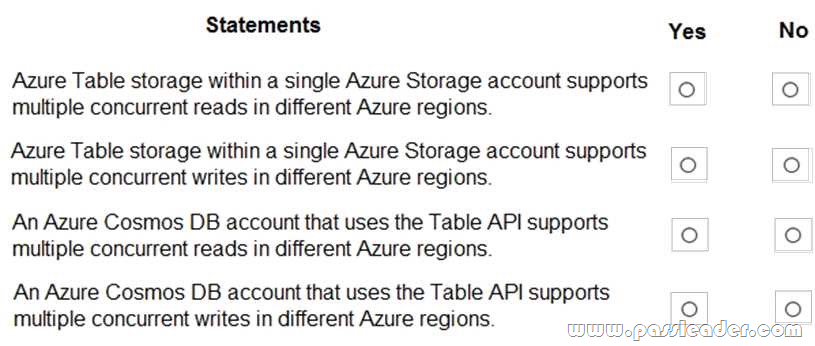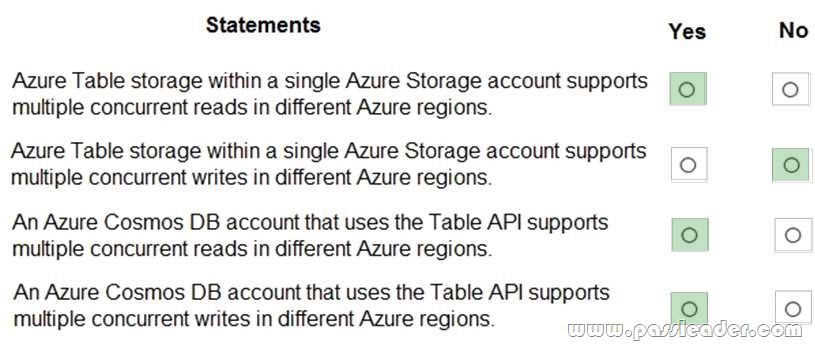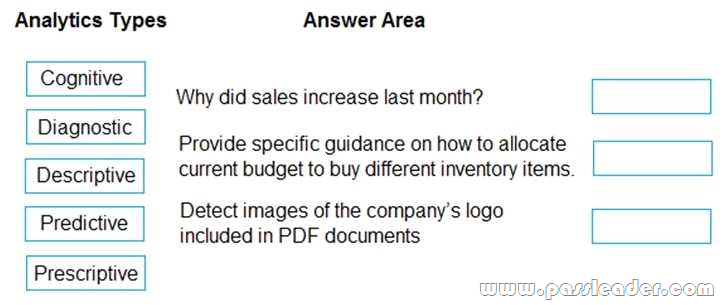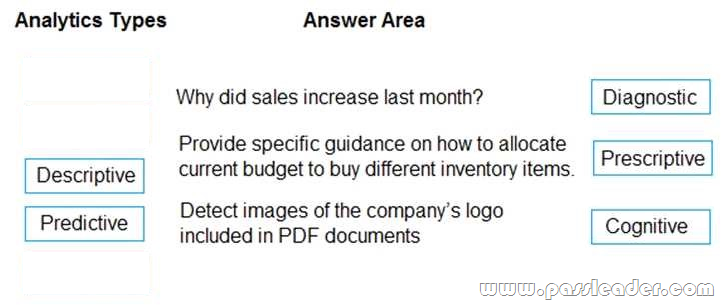Valid DP-900 Dumps shared by PassLeader for Helping Passing DP-900 Exam! PassLeader now offer the newest DP-900 VCE dumps and DP-900 PDF dumps, the PassLeader DP-900 exam questions have been updated and ANSWERS have been corrected, get the newest PassLeader DP-900 dumps with VCE and PDF here: https://www.passleader.com/dp-900.html (187 Q&As Dumps –> 205 Q&As Dumps –> 223 Q&As Dumps –> 265 Q&As Dumps –> 298 Q&As Dumps)
BTW, DOWNLOAD part of PassLeader DP-900 dumps from Cloud Storage: https://drive.google.com/drive/folders/1KVm9yLs7bGNVTtceGoedKdVG1lgN24TY
NEW QUESTION 171
Which statement is an example of Data Manipulation Language (DML)?
A. REVOKE
B. DISABLE
C. CREATE
D. UPDATE
Answer: D
Explanation:
Data Manipulation Language (DML) affect the information stored in the database. Use these statements to insert, update, and change the rows in the database.
https://docs.microsoft.com/en-us/sql/t-sql/statements/statements
NEW QUESTION 172
You need to create an Azure resource to store data in Azure Table storage. Which command should you run?
A. az scorage share create
B. az scorage account creace
C. az cosmosdb creace
D. az scorage concainer creace
Answer: D
Explanation:
https://docs.microsoft.com/en-us/cli/azure/storage/container?view=azure-cli-latest
NEW QUESTION 173
You need to modify a view in a relational database by adding a new column. Which statement should you use?
A. MERGE
B. ALTER
C. INSERT
D. UPDATE
Answer: B
NEW QUESTION 174
Which statement is an example of Data Definition Language (DDL)?
A. SELECT
B. INSERT
C. DELETE
D. DROP
Answer: D
Explanation:
Data Definition Language (DDL) statements defines data structures. Use these statements to create, alter, or drop data structures in a database. These statements include:
– ALTER
– Collations
– CREATE
– DROP
– DISABLE TRIGGER
– ENABLE TRIGGER
– RENAME
– UPDATE STATISTICS
– TRUNCATE TABLE
https://docs.microsoft.com/en-us/sql/t-sql/statements/statements
NEW QUESTION 175
You need to store data by using Azure Table storage. What should you create first?
A. an Azure Cosmos DB instance
B. a storage account
C. a blob container
D. a table
Answer: B
Explanation:
First create an Azure storage account, then use Table service in the Azure portal to create a table. Note: An Azure storage account contains all of your Azure Storage data objects: blobs, files, queues, and tables.
https://docs.microsoft.com/en-us/azure/storage/tables/table-storage-quickstart-portal
https://docs.microsoft.com/en-us/azure/storage/common/storage-account-create
NEW QUESTION 176
You need to recommend a data store service that meets the following requirements:
– Native SQL API access.
– Configurable indexes.
What should you recommend?
A. Azure Files
B. Azure Blob storage
C. Azure Table storage
D. Azure Cosmos DB
Answer: D
Explanation:
Azure Cosmos DB comes with native Core (SQL) API support. In Azure Cosmos DB, data is indexed following indexing policies that are defined for each container. The default indexing policy for newly created containers enforces range indexes for any string or number. This policy can be overridden with your own custom indexing policy.
https://docs.microsoft.com/en-us/azure/cosmos-db/sql/how-to-manage-indexing-policy
NEW QUESTION 177
Your company needs to design a database that illustrates the relationships between utilization levels of individual network devices across a local area network. Which type of data store should you use?
A. graph
B. key/value
C. document
D. columnar
Answer: A
Explanation:
Data as it appears in the real world is naturally connected. Traditional data modeling focuses on defining entities separately and computing their relationships at runtime. While this model has its advantages, highly connected data can be challenging to manage under its constraints. A graph database approach relies on persisting relationships in the storage layer instead, which leads to highly efficient graph retrieval operations. Azure Cosmos DB’s Gremlin API supports the property graph model.
https://docs.microsoft.com/en-us/azure/cosmos-db/graph-introduction#introduction-to-graph-databases
NEW QUESTION 178
What is the primary purpose of a data warehouse?
A. to provide answers to complex queries that rely on data from multiple sources
B. to provide transformation services between source and target data stores
C. to provide read-only storage of relational and non-relational historical data
D. to provide storage for transactional line-of-business (LOB) applications
Answer: C
Explanation:
Consider using a data warehouse when you need to keep historical data separate from the source transaction systems for performance reasons. Data warehouses make it easy to access historical data from multiple locations, by providing a centralized location using common formats, keys, and data models. Query both relational and nonrelational data.
https://docs.microsoft.com/en-us/azure/architecture/data-guide/relational-data/data-warehousing
NEW QUESTION 179
HotSpot
To complete the sentence, select the appropriate option in the answer area.

Answer:

Explanation:
https://demand-planning.com/2020/01/20/the-differences-between-descriptive-diagnostic-predictive-cognitive-analytics/
https://azure.microsoft.com/en-us/blog/answering-whats-happening-whys-happening-and-what-will-happen-with-iot-analytics/
https://docs.microsoft.com/en-us/azure/media-services/previous/media-services-index-content
NEW QUESTION 180
Drag and Drop
Your company plans to load data from a customer relationship management (CRM) system to a data warehouse by using an extract, load, and transform (ELT) process. Where does data processing occur for each stage of the ELT process? (To answer, drag the appropriate locations to the correct stages. Each location may be used once, more than once, or not at all. You may need to drag the split bar between panes or scroll to view content.)

Answer:

Explanation:
Box 1: The CRM system. Data is extracted from the CRM system.
Box 2: The data warehouse. Data is loaded to the data warehouse.
Box 3: A standalone data analysis tool. The data transformation that takes place usually involves various operations, such as filtering, sorting, aggregating, joining data, cleaning data, deduplicating, and validating data.
https://docs.microsoft.com/en-us/azure/architecture/data-guide/relational-data/etl
NEW QUESTION 181
HotSpot
For each of the following statements, select Yes if the statement is true. Otherwise, select No.

Answer:

Explanation:
Box 1: Yes. For read access to the secondary region, configure your storage account to use read-access geo- redundant storage (RA-GRS) or read-access geo-zone-redundant storage (RA-GZRS).
Box 4: Yes. Azure Cosmos DB supports multi-region writes.
https://docs.microsoft.com/en-us/azure/storage/common/storage-redundancy
https://manojchoudhari.wordpress.com/2019/12/16/azure-cosmos-db-enable-multi-region-writes
NEW QUESTION 182
HotSpot
For each of the following statements, select Yes if the statement is true. Otherwise, select No.

Answer:

Explanation:
https://docs.microsoft.com/en-us/azure/databricks/scenarios/what-is-azure-databricks
https://docs.microsoft.com/en-us/azure/analysis-services/analysis-services-overview
https://docs.microsoft.com/en-us/azure/data-factory/introduction
NEW QUESTION 183
HotSpot
To complete the sentence, select the appropriate option in the answer area.

Answer:

Explanation:
A key mechanism that allows Azure Data Lake Storage Gen2 to provide file system performance at object storage scale and prices is the addition of a hierarchical namespace. This allows the collection of objects/files within an account to be organized into a hierarchy of directories and nested subdirectories in the same way that the file system on your computer is organized. With a hierarchical namespace enabled, a storage account becomes capable of providing the scalability and cost-effectiveness of object storage, with file system semantics that are familiar to analytics engines and frameworks.
https://docs.microsoft.com/en-us/azure/storage/blobs/data-lake-storage-namespace
NEW QUESTION 184
Drag and Drop
Match the types of analytics that can be used to answer the business questions. (To answer, drag the appropriate analytics type from the column on the left to its QUESTION on the right. Each analytics type may be used once, more than once, or not at all.)

Answer:

Explanation:
Box 1: Diagnostic. Diagnostic Analytics: At this stage you can begin to answer some of those why questions. Historical data can begin to be measured against other data to answer the QUESTION of why something happened in the past. This is the process of gathering and interpreting different data sets to identify anomalies, detect patters, and determine relationships.
Box 2: Prescriptive. Prescriptive analytics is a combination of data, mathematical models, and various business rules to infer actions to influence future desired outcomes.
https://demand-planning.com/2020/01/20/the-differences-between-descriptive-diagnostic-predictive-cognitive-analytics/
https://azure.microsoft.com/en-us/blog/answering-whats-happening-whys-happening-and-what-will-happen-with-iot-analytics/
NEW QUESTION 185
……
Get the newest PassLeader DP-900 VCE dumps here: https://www.passleader.com/dp-900.html (187 Q&As Dumps –> 205 Q&As Dumps –> 223 Q&As Dumps –> 265 Q&As Dumps –> 298 Q&As Dumps)
And, DOWNLOAD the newest PassLeader DP-900 PDF dumps from Cloud Storage for free: https://drive.google.com/drive/folders/1KVm9yLs7bGNVTtceGoedKdVG1lgN24TY